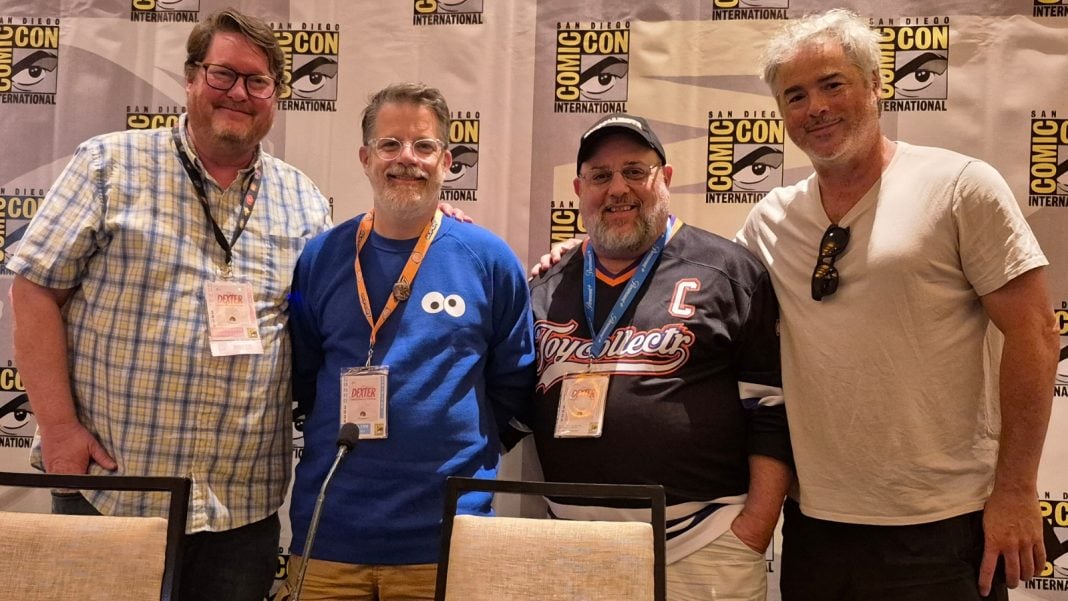by Gabriel Neeb
“Welcome to Comic-Con! We’re here to depress you!”
One of the most consequential panels at San Diego Comic-Con 2025 took place at the Omni Hotel, just across the street from the Convention Center. Why was it consequential? Because it will affect your pocketbook.
“Toys, Tariffs, and Trade Wars” hosted four professionals who have worked in the toy and collectibles fields for years. Daniel Pickett (actionfigureinsider.com), Bryan Fuller (Super 7), Blake Wright (Editor-in-Chief, Toycollectr Magazine), and Jonathan Cathey (CEO, The Loyal Subjects) gathered to discuss the ups and downs of a trade war none of them wanted.
For context, toys have not been subject to tariffs for decades, even after the majority of companies moved their manufacturing overseas in the mid-20th century. Then Trump won the November 2024 election and has been instituting tariffs ranging from 30 to 145 percent depending on… well, lots of things. They aren’t necessarily nation-specific, but they are always said to somehow revive American industries.
However, as pointed out by the panelists, overseas industries with newly-imposed tariffs don’t exist in the United States. Cathey stated that tariffs are not a national security risk. Flynn was clear that tariffs automatically placed companies in the red as they lost money. Toy manufacturing is a sector where profit margins are usually around 10 percent, so a 30 percent tariff eats profits and can often force losses. Flynn said that a recent shipment of items manufactured overseas resulted in an unexpected $490 thousand fee in March 2025. Those items don’t leave the port until the tariffs get paid.
The myth of “bringing jobs back to America” was continually dissected by the panel. In addition to the fact that the manufacturing element mostly left in the 1950s and ’60s, the kind of specialization required to manufacture (one example was the use of up to 150 paint applications for one specific item) doesn’t exist in the U.S. American toy companies and their contracted factories have also developed careful relationships over the decades and replicating those in the U.S. from the ground-up is nearly impossible.
While the panel was made up of professionals that worked in the smaller scale section of the toy industry, it was pointed out that the stalwart manufacturer, Mattel—one of the industry giants—recently reported a drop in sales.
And this is only the beginning. The real effects of the tariffs won’t be truly felt until August, September, and October when companies and retailers start pricing in accordance with the demands of cost of business—which is increasing 30 to 145 percent. These are the critical months where retailers start planning for the lucrative holiday season, and when manufacturers start planning their 2026 output including the items they plan on offering at next year’s Comic-Con.
With all of this in mind, the panelists said there is a way forward (slow though it may be). While Trump is often influenced by “public sentiment” and has been known to back down on some of his decrees, the most effective check on the trade war would be for the citizenry to vote in the 2026 midterm elections against politicians currently supporting the tariff policy. The panel and a few audience members noted that a fix is at least two years away, but a more economically sensible governing body is a step in the right direction.
“Tariffs affect you guys!” was the theme of the panel. The panel dispensed with the myth of a “sleeping industrial giant” in the U.S. because it doesn’t exist. The panelists’ companies and their gargantuan counterparts and competitors are experiencing an economic impact which may push them out of business before sensible trade policies are enacted.
Stay tuned to The Beat for more coverage from SDCC ’25.









